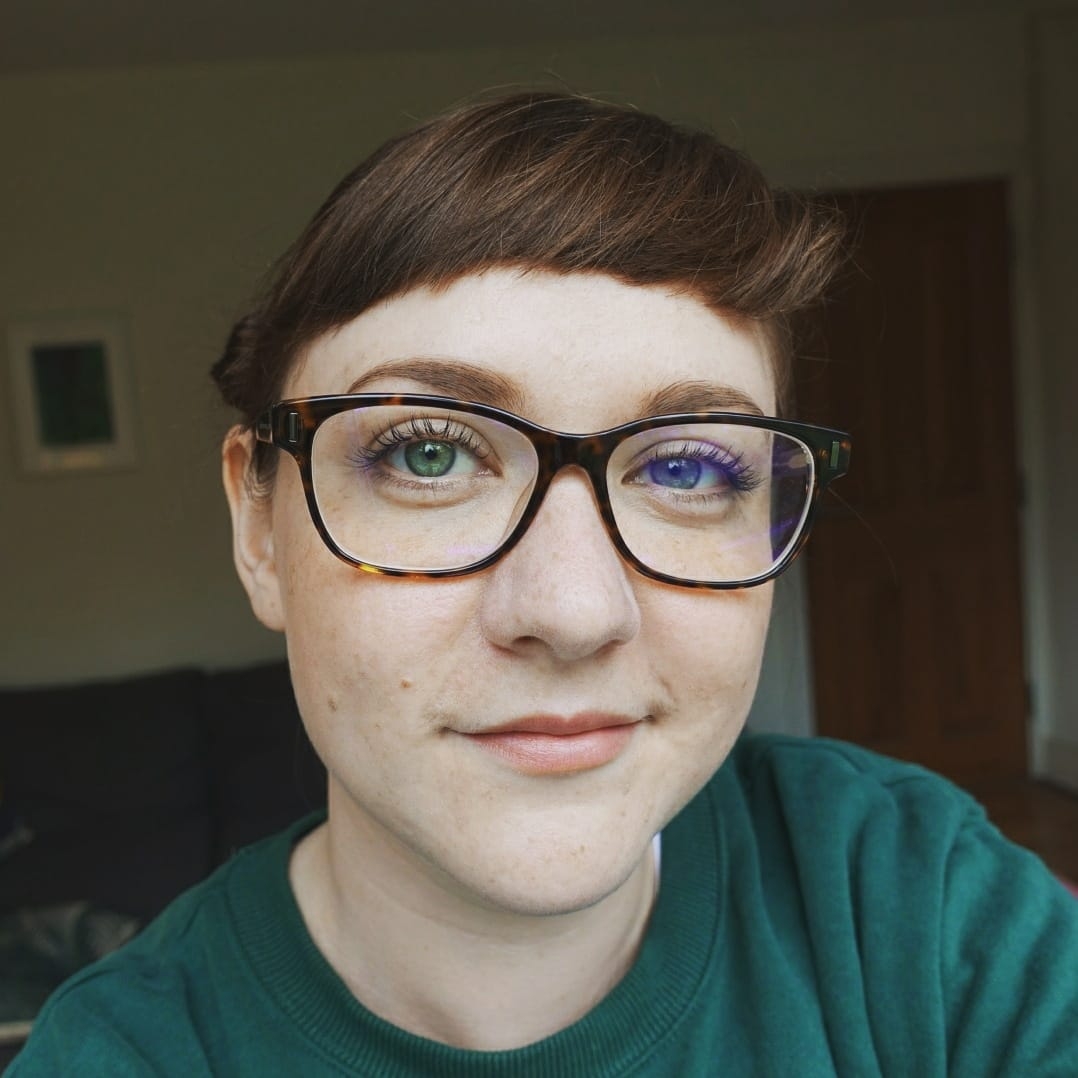THE DIGITAL ETHNOGRAPHY COLLECTIVE
In October 2019 I Co-Founded The Digital Ethnography Collective (formerly the LSE Digital Ethnography Collective), an interdisciplinary group exploring the intersections of digital culture and ethnographic methods, with Branwen Spector. We invite scholars at all levels to join us for regular public lectures, events and workshops. We welcome those interested in online culture (Internet/platforms/social media), and the ethnographic study of digital technologies. The aim of the group is to establish a global community of scholars of digital ethnography and to work through challenges in this growing subdiscipline.
- Join our MAILING LIST
- Follow us on Twitter @DigECollective
- Watch our archived LIVESTREAMS
- Download our collaboratively produced Digital Ethnography Reading List (July 2025)
- Add you details to the Digital Ethnographers Directory
- Email us at digitalethnographycollective@gmail.com

PAST EVENTS

WATCH RECORDING HERE
Are you curious about how social media content creators navigate the challenges and opportunities of platform-dependent work? Do you want to know what goes into writing and publishing an academic monograph about influencer industries and culture? We are delighted to invite you to a virtual authors roundtable on 10th May 2024, where the wonderful Brooke Erin Duffy, Sophie Bishop and Angèle Christin will be in conversation about their eagerly awaited upcoming books!
We’ll hear about each of these fascinating projects and discuss the many productive points of overlap between them, including how each author approached this volatile and ever-changing topic to come to their rich accounts of creator labour, cultures and industries. We’ll also peak behind the curtain into the mechanics of writing an academic monograph: starting with the proposal and contract stage, through those painful writing hurdles, right up to publication day. This will be followed by an audience Q&A. As usual, our events are designed to be interactive and generative of ideas and conversation, so we hope you’ll come with questions! The event will be chaired by The Digital Ethnography Collective Co-Founder Zoë Glatt and moderated by Sarah Edwards (UW-Madison).
BOOK BLURBS
Influencer Creep, Sophie Bishop (under contract, University of California Press)
This book uncovers influencer culture as a hypocentre of pressures to be ‘always on’, share more ‘authentically’ and to be responsive to ‘black boxed’ algorithmic whims. Through reviewing the political economy of influencer cultures, I show how influencers and intermediaries such as platforms, talent managers and brands contributed to foundational influencer practices, conventions, and experiences. Now, pressures and practices originated with influencer economies are central to the lives of creative workers such as artists and makers. Influencer creep thus helps us understand how platform power users’ dynamics have informed participation and representation within culture, as social media platforms become increasingly central to the professional and personal lives of creative workers, and beyond. Influencer creep reveals important context for contemporary cultural lives and experiences of labour, showing how platformised promotional culture has informed responses to hierarchies of (in)visibility along the lines of class, gender and race.
The Visibility Bind: Platforms, Power, and Precarity in the Creator Economy, Brooke Erin Duffy (under contract, University of Chicago Press)
With much of the tech sector reeling from layoffs and financial strife, platform companies—from Meta and YouTube to TikTok and Twitch—are doubling down on their idealistic framing of the digital “Creator Economy.” But the image of social media as an entrepreneurial Promised Land is belied by the precarious, even perilous realities of platform-dependent labor. Drawing upon more than 80 interviews with digital content creators, influencers, and streamers, I illuminate the source of their plight: a platformed visibility bind. In a labor market where algorithms are considered key arbiters of success—and failure—creators struggle to defy the imminent threat of invisibility. But they must also reckon with the risks of hypervisibility, from burnout and cultural appropriation to trolling and targeted harassment. The conditions and consequences of this bind are amplified for marginalized creators—including women, people of color, and members of the LGBTQ+ community. A necessary rejoinder to creator economy boosterism, The Visibility Bind disentangles the promises from the precarities of the new world of creative work. And while the book foregrounds the experiences of social media creators, it has lessons for anyone roused to comply with the siren song to “put yourself out there.”
Follow Me: Influencers, Platforms, and the Rise of the Follower Economy, Angèle Christin (under contract, University of Chicago Press)
Existing research on social media platforms often emphasizes the role of algorithmic sorting and platform failure to explain the proliferation of misinformation and hate speech online. In this project, I switch the focus from distribution dynamics to the social contexts of production to understand where problematic content comes from. Drawing on interviews and observations with social media influencers and marketers, I find that social media platforms and brands create precarious structures and problematic incentives for individuals seeking to make a living from their online production. Over time, many influencers end up engaging in drama—highly publicized interpersonal conflicts—or producing extreme and inflammatory content in an attempt to cement the loyalty of online followers. I analyze these dynamics as part of the rise of a follower economy that is reshaping many domains of public debate. I conclude by discussing the relevance of this framework for the study of the online public sphere more broadly.
SPEAKER BIOS
Sophie Bishop is an Associate Professor in Media and Communications at the University of Leeds. Her research focuses on promotion within platformization, and has been published in journals such as Social Media + Society, New Media & Society and the Sociological Review. Sophie was Specialist Advisor to the UK Parliamentary Inquiry into Influencer Culture and has contributed to EU Policy on the impact of influencers on advertising.
Brooke Erin Duffy, Ph.D., is a social media researcher, author, and Associate Professor in the Department of Communication at Cornell University. Her books include (Not) Getting Paid to Do What You Love: Gender, Social Media, and Aspirational Work (Yale University Press, 2017)—which was recognized as one of the “Top Tech Books of 2017” by Wired—and Platforms and Cultural Production, with Thomas Poell and David Nieborg (Polity, 2021).
Angèle Christin is an associate professor of Communication and the faculty director of the Digital Civil Society Lab at Stanford University. She studies how algorithms and analytics transform professional values, expertise, and work practices.
Sarah Edwards is finishing her PhD in Media and Cultural Studies at the University of Wisconsin-Madison. Her research focuses on the influencer industry and the intermediaries that surround it to examine how influencers are increasingly professionalizing and collectivizing. Her work has been published in journals like Social Media and Society.
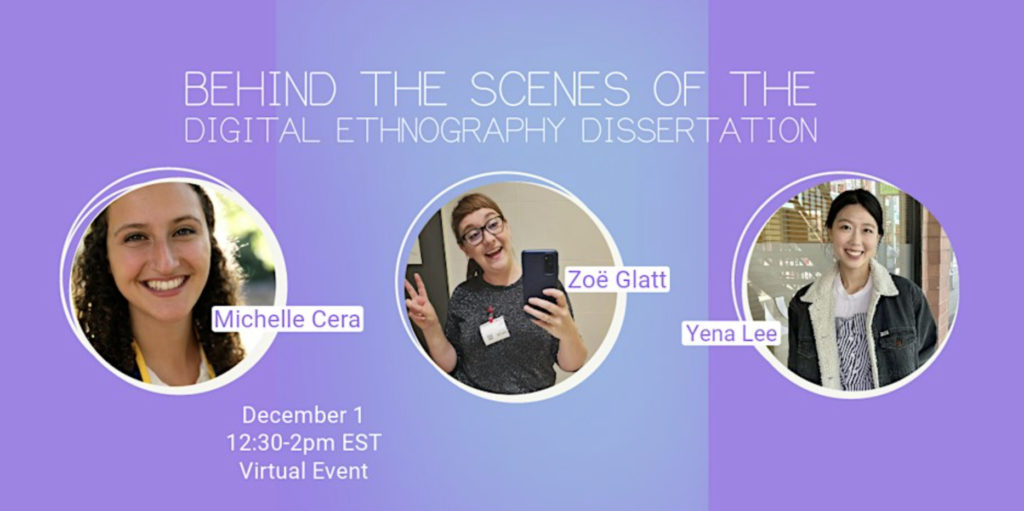
WATCH RECORDING HERE
Please join the Rutgers Digital Ethnography Working Group (DEWG) in collaboration with The Digital Ethnography Collective for our upcoming event Behind the Scenes of a Digital Ethnography Dissertation on December 1st 2023, with panellists Michelle Cera, Zoe Glatt and Yena Lee.
As every ethnographer knows, there’s often a gap between our best-laid research plans and our research realities – whether because of time/mobility constraints, funding issues, access challenges, or any number of other roadblocks we may encounter. And for dissertating graduate students, this gap can be especially tricky to navigate. This panel will bring together advanced and recently graduated PhD students for a conversation about the gritty reality of doing a digital ethnography dissertation. Panellists will speak candidly about their experiences with digital ethnographic data collection, analysis, and writing, while also teaching, RAing, navigating the job market, and living lives outside of work.
ABOUT OUR PANELLISTS:
Michelle Cera is a doctoral candidate in the sociology department at New York University where she studies politics, gender, inequality, and social media. She has studied and written about the pandemic and gender inequality, the ethics of digital ethnography, young adult dating practices, and the gendered nature of hookup culture. Her dissertation focuses on far-right extremism on social media platforms.
Dr. Zoe Glatt is a feminist media scholar with interests in platformised creative industries and labour, social media and influencer cultures, and digital ethnographic methods. She is a Postdoctoral Researcher at Microsoft Research New England, where she is working on her first book manuscript, Demonetised: Inequality, Co-Option and Resistance in the Influencer Industry, as well as new research into the intersections of AI and the creator economy. She is the co-founder of The Digital Ethnography Collective, an interdisciplinary group exploring the intersections of digital culture and ethnographic methods. She is also currently in the process of setting up the Content Creator Scholars Network (CCSN), for researchers studying influencer industries and creator culture.
Yena Lee is a Ph.D. candidate in the Media, Technology, and Society program at Northwestern School of Communication. Her research interweaves political communication, the sociology of social movements, and political economy of new media to study the mediated forms and processes of democratic participatory politics with a focus on relationships. Her dissertation advances grassroots models of democratic citizenship that account for the ways content creators have translated conventional notions of good citizenships to form civic relationships. She has authored publications in leading outlets theorizing about relationships in networked grassroots activism. In a study published in Information, Communication & Society, she compares two case studies of feminist networked movement leadership from Korea—SchoolMeToo and Telegram Sextortion Ring Protest—to develop an understanding of brokerage as the type of communication that goes beyond the neutral act of connecting to reshaping the relationship between grassroots and institutional actors. Her research published in the International Journal of Communication adopts concepts of relational scripts and schemas to theorize networked relationships, illustrating the importance of studying relationships as integral building blocks of networked publics and instruments for resisting harmful technocultures.
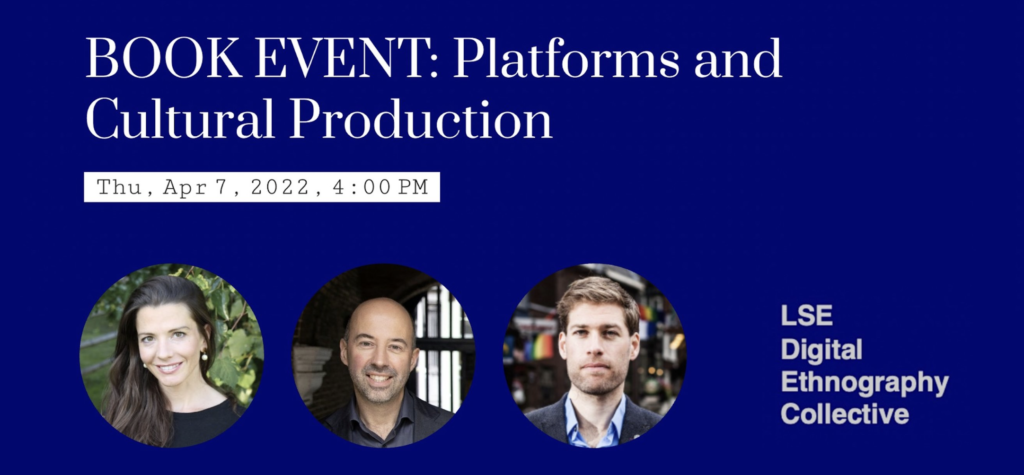
WATCH RECORDING HERE
The LSE Digital Ethnography Collective are delighted to invite you to our next zoom event on Thursday 7th April (4-6pm BST), where the wonderful Brooke Erin Duffy, Thomas Poell and David Nieborg will be discussing their new book Platforms and Cultural Production (Polity, 2021). The authors will present some of the findings of the book, which examines both the processes and implications of platformization across the cultural industries. This will be followed by an audience Q&A. As usual, our events are designed to be interactive andgenerative of ideas and conversation, so we hope you’ll come with questions. The event will be chaired by LDEC Co-Founder Zoë Glatt.
BOOK DESCRIPTION: The widespread uptake of digital platforms – from YouTube and Instagram to Twitch and TikTok – is reconfiguring cultural production in profound, complex, and highly uneven ways. Longstanding media industries are experiencing tremendous upheaval, while new industrial formations – live-streaming, social media influencing, and podcasting, among others – are evolving at a breakneck pace. In ‘Platforms and Cultural Production’, the authors identify key changes in markets, infrastructures, and governance at play in this ongoing transformation, as well as pivotal shifts in the practices of labour, creativity, and democracy. Foregrounding simultaneous changes in institutional relations and cultural practices, the authors define platformisation as: the penetration of digital platforms’ economic, infrastructural, and governmental extensions into the cultural industries, as well as the organisation of cultural practices of labour, creativity, and democracy around these platforms. Exploring how these interrelated changes take shape in different industrial and geographic contexts, they discuss key variations in the trajectories of transformation. This analytical framework should assist students, scholars, policy-makers, and practitioners in their efforts to understand how the institutions and practices of cultural production are evolving in the era of platforms.
Brooke Erin Duffy is an Associate Professor at Cornell University, where she holds appointments in the Department of Communication and the Feminist, Gender, and Sexuality Studies program. Her specific areas of interest include digital and social media industries; gender, identity, and inequality; and the impact of new technologies on creative work and labor. She’s the author of two monographs on gender and cultural production, including (Not) Getting Paid to Do What You Love: Gender, Social Media, and Aspirational Work (Yale University Press, 2017), which Wired ranked as one of the “Top Tech Books of 2017.”
Thomas Poell is Professor of Data, Culture & Institutions at the University of Amsterdam and director of the Research Priority Area on Global Digital Cultures. His research is focused on the societal consequences of the rise of digital platforms. He has published widely on social media and popular protests around the globe, as well as on the role of these media in the development of new forms of journalism. Poell is co-author of three books, including The Platform Society: Public Values in a Connective World (Oxford University Press, 2018).
David B. Nieborg is an Assistant Professor of Media Studies at the University of Toronto. He holds a PhD from the University of Amsterdam and held visiting and fellowship appointments with MIT, the Queensland University of Technology, and the Chinese University of Hong Kong. He published widely on the game industry, app and platform economics, and game journalism in academic outlets such as New Media & Society, Social Media + Society and Media, Culture and Society.
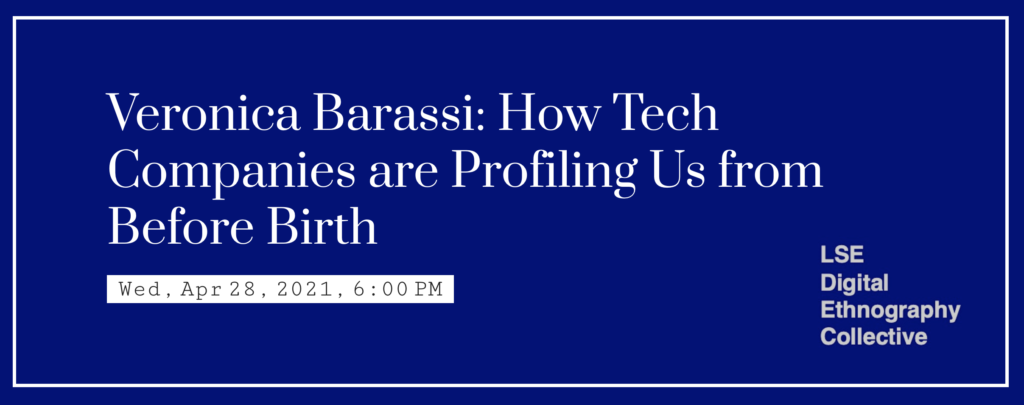
WATCH RECORDING HERE
The LSE Digital Ethnography Collective are delighted to invite you to our next zoom event with the wonderful Professor Veronica Barassi on Wednesday 28th April (6-7:30pm BST). Veronica will be talking about her new book Child Data Citizen: How Tech Companies are Profiling Us from Before Birth (MIT Press, 2020) and will also be discussing her experience as an ethnographer in making sense of the datafication of family life. By looking at the human tensions and sensory experience of datafication, she will reflect on the merits and challenges of ethnography and autoethnography in the understanding of our complex data environments.
BOOK DESCRIPTION: Child Data Citizen is the direct result of the Child | Data | Citizen project. The book explores the datafication of children and its democratic implications. Today, for the first time in history we are tracking individual children from long before they are born. From the moment in which a child is conceived, important biometric information is uploaded on social media or pregnancy apps. As children grow up, most of their health and educational data is digitized, archived and sold by privately owned corporations. All these different forms of data monitoring and processing are just the tip of the iceberg. The picture becomes much more complex if we consider the role played by home hubs, artificial intelligence devices, and facial recognition technologies. What is becoming obvious is that children’s personal information is now being collected, archived, sold and profiled in ways that were not possible before. The book talks directly about this transformation, and critically reflects on its implications for our society and our democratic futures. The book focuses on four different typologies of children’s data: health data, education data, home life data and social media data. It has been written by an anthropologist and a parent, who spent three years working with families in the UK and the US and analyzing the complex ways in which children’s data is being produced, collected, aggregated, and shared. The author combines intimate stories about data-tracking in family life, parental consent, and ‘sharenting’ with a critical investigation into the privacy policies, business models, patents applications and sharing agreements that allow companies and other agents to mine children’s data. Barassi argues that when we think about children’s data traces the question at heart is not only one about privacy, but about how these data traces may be used by AI systems and predictive analytics to profile them throughout their lives, and define them in public, as citizens. By engaging with critical question about algorithmic bias, AI ethics and data justice, the book asks what are the social and political implications of building a society where data traces are made to talk for and about citizens across a life-time? And how can we protect ourselves when we realize that the ‘predictions’ and narratives that algorithms construct about individuals are reductionist, discriminatory and, in the case of children, pre-emptive representations of who they are?
Veronica Barassi is an anthropologist, the mother of two daughters, and Professor in Media and Communication Studies in the School of Humanities and Social Sciences (SHSS-HSG) at the University of St. Gallen, as well as the Chair of Media and Culture at the MCM Institute (MCM-HSG). She was previously a Senior Lecturer in the Department of Media and Communications at Goldsmiths University of London, where she launched together with her colleagues the Goldsmiths Media Ethnography Group. Her work has appeared in top-ranked international journals and edited collections. Her first book, Activism on the Web: Everyday Struggles against Digital Capitalism (Routledge, 2015), was the product of years of ethnographic research (funded by the AHRC and the British Academy) on digital participation and social media campaigning. Her TED Talk on What Tech Companies know about Children has reached more than 1.6 million views. At the moment she is launching a new project titled The Human Error: AI, Human Rights and the Conflict over Algorithmic Profiling.
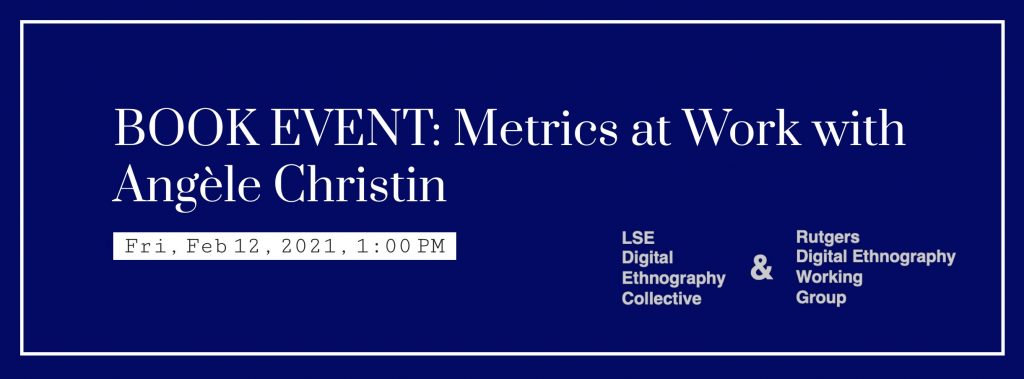
WATCH RECORDING HERE
The LSE Digital Ethnography Collective (LDEC) and Rutgers Digital Ethnography Working Group (DEWG) are excited to invite you to our co-hosted zoom conversation with Stanford ethnographer Angèle Christin on Friday 12th February (1-3pm EST/6-8pm GMT). We will be discussing her new book Metrics at Work: Journalism and the Contested Meaning of Algorithms (Princeton University Press, 2020).Professor Christin will be interviewed by Jeffrey Lane (DEWG Co-Chair) and Zoë Glatt (LDEC Co-Founder) and the event will be chaired by Melissa Aronczyk(DEWG Co-Chair). They will discuss the book’s findings and how Christin adapted her fieldwork to study algorithms inside the newsroom, in addition to the new methods Christin has developed to study algorithmic labor ethnographically during social distancing. This will be followed by a Q&A with all event attendees.
BOOK DESCRIPTION: When the news moved online, journalists suddenly learned what their audiences actually liked through algorithmic technologies that scrutinize web traffic and activity. How have audience metrics changed journalists’ work practices and professional identities? In Metrics at Work, Angèle Christin analyzes the ways that journalists grapple with audience data in the form of clicks, and how new forms of clickbait journalism travel across national borders. Drawing on four years of fieldwork in web newsrooms in the United States and France, including more than one hundred interviews with journalists, Christin reveals many similarities among the news websites—their editorial goals, technological tools, and even office furniture. Yet she uncovers crucial and paradoxical differences in how American and French journalists understand audience analytics and how these affect the news produced in each country. The book shows how distinct cultural forces and journalistic traditions shape how journalists make sense of digital metrics. Contrary to the popular belief that analytics and algorithms are globally homogenizing forces, Metrics at Work shows that computational technologies can have surprisingly divergent ramifications for work and organizations worldwide.
Angèle Christin is an assistant professor in the Department of Communication and affiliated faculty in the Sociology Department and Program in Science, Technology, and Society at Stanford University. She studies how algorithms and analytics transform professional values, expertise, and work practices. You can follow her on Twitter @AngeleChristin and visit her website www.angelechristin.com.
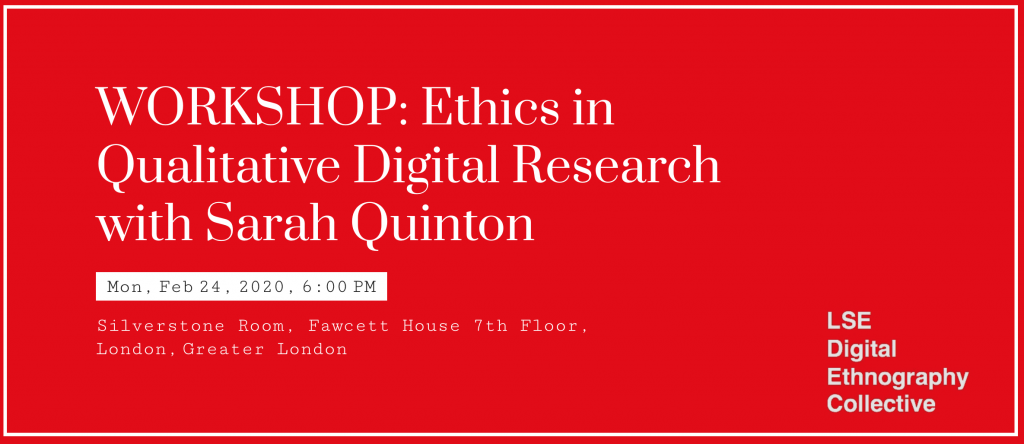
WATCH RECORDING HERE
Based on popular demand, we are delighted to invite you to our next workshop ‘Ethics in Qualitative Digital Research’ with the wonderful Sarah Quinton on Monday 24th February. The ever-evolving digital landscape presents ethnographers with novel ethical challenges and dilemmas, many of which our members face in their own research. This session is designed to be a hands-on workshop that will help attendees grapple with the ethical dimension of their projects, offering suggestions for good practice. Sarah will give her more general guidance regarding the ethical conduct of qualitative digital research, and then as a group we will discuss given scenarios and collaboratively unpick these to find ways forward. Insights based on Sarah’s extensive experience will be provided to encourage, enlighten and challenge assumptions. Participants will also have the opportunity to discuss their own work with Sarah and receive her expert advice. We are so lucky to have Sarah run this session for us, as she’s an authority on social science research specifically relating to the digital, having recently authored Understanding Research in the Digital Age (Sage 2018), and is additionally the Chair of the Research Ethics Committee at Oxford Brookes University.
Sarah Quinton is Reader in Digital Society at Oxford Brookes University where she encourages research in the dynamic, technology enabled world. She is the author of multiple peer reviewed articles, two Sage books, supervisor to many inspiring PhD students, and a collaborative researcher with colleagues in Europe and Australia. Her current research focuses on the role of digital technology in alleviating social isolation, through social connectivity, to enhance wellbeing in older citizens. Her interdisciplinary work involves creative, participatory research methods, including digital ethnography to engage and give voice to this underrepresented but growing group in society.
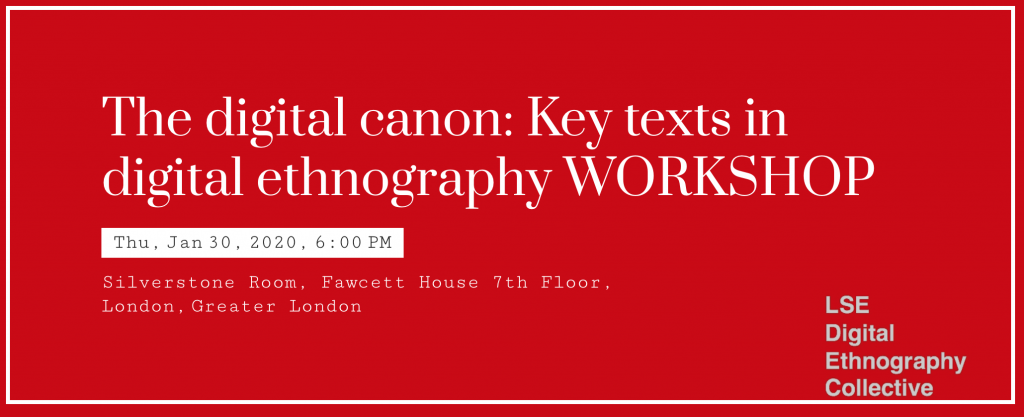
WATCH RECORDING HERE
We are pleased to invite you to our next event ‘The digital canon: Key texts in digital ethnography’ on Thursday 30th January. This session takes the form of a collaborative workshop as we invite scholars of digital ethnography and enthusiasts to join us in discussing ‘what is canon?’ in digital ethnography. As qualitative research departments around the world begin to pay more attention to digital ethnography as a method but teaching on the subject remains in its infancy, we aim to develop a reading list of essential, exemplary, and exciting digital ethnographic research. We’ll be tackling such subjects as method, ethics, theory, as well as different directional interests within the genre such as gaming, labour, visual culture, new modes of sociality, and other emerging themes.
This session is designed to benefit both those researchers with a strong background in the relevant literature looking to develop a reading list and scholars new to the genre wanting to know where to start. We invite participants to come with a list of digital ethnographic readings that they are working with so that we can compile a master reading list together during the workshop. If you do not have a list of readings already then you are still welcome to attend. We have a strong network of expertise and we have high hopes that this will be an extremely generative and collaborative session, between those who can attend in person and those who can contribute via the livestream chat. We will be sending the compiled reading list out to our full mailing list afterwards, in hopes that this will be a very useful document for all of our members. [READING LIST AVAILABLE HERE]
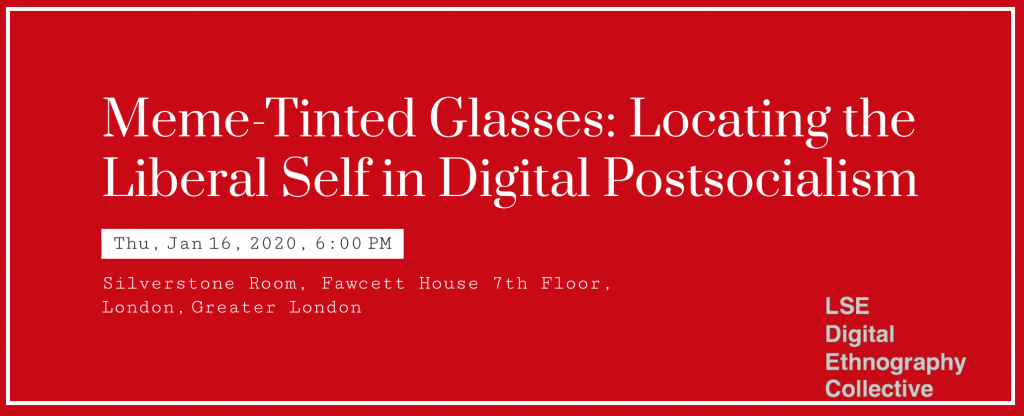
WATCH RECORDING HERE
Happy New Year! We are delighted to announce our next event on Thursday 16th January with Rik Adriaans (UCL Digital Anthropology) titled Meme-Tinted Glasses: Locating the Liberal Self in Digital Postsocialism. The session will consist of a talk from Rik followed by discussion on his work and broader issues around digital ethnographic research of visual culture. During the 2010s, internet memes have solidified their place as a global vernacular. Challenging the digital dualism of offline and online, memes are increasingly referenced, reappropriated and performed in a wide range of settings beyond the scope of social media platforms. Drawing on examples from Hungary and Armenia, this presentation examines how memetic sensibilities have become central to the ways in which liberal youth orient themselves in the everyday politics of postsocialist transformations. It explores how perceived remnants of socialism and elements of the illiberal present are turned into a source of the liberal self by apprehending them through the ironic sensibilities of the internet meme form. No longer bound by digital devices such as smartphones, the memeification of reality is key to the everyday negotiation of dichotomies of capitalist modernity versus the socialist past, orient versus occident, as well as class antagonisms and rural-urban divisions.
Rik Adriaans is a Teaching Fellow in Digital Anthropology at UCL Anthropology. He is interested in questions of media and mediation, (trans)nationalism, post-socialism and public culture with a regional focus on Armenia and the global Armenian diaspora. His doctoral thesis was a multi-sited ethnography of the media circuits connecting the Armenian diaspora of Los Angeles to post-Soviet transition.
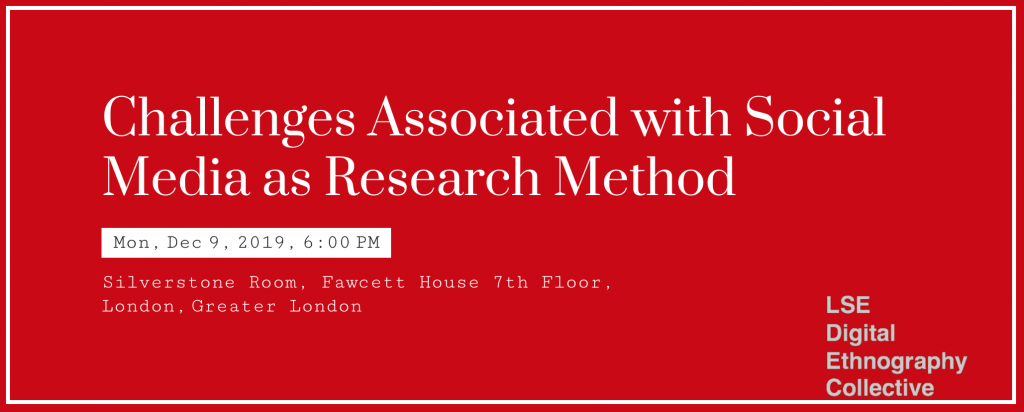
Please join us on Monday 9th December for a workshop run by Branwen Spector (LSE) and Theodora Sutton (OII) on the challenges associated with social media as research method. Ethnographic research increasingly involves the use of the Internet and social media, both by the researcher as a method and by one’s interlocutors. The literature on ethnographic methods using the Internet, however, are often outdated and do not reflect sufficiently on the experiences of the researcher. In this workshop, Theodora and Branwen will discuss their experiences working with online communities both on- and off-line and present their suggestions and strategies for three stages of fieldwork using social media; pre-field, during fieldwork, and post-field, offering advice on opportunities for access, ethical dilemmas, managing online and offline relationships, negotiating consent and data safety, and boundary creation – all of which are impacted by the use of new digital tools in ethnographic research. We will then open the discussion to providing and crowdsourcing thoughtful guidance on how to use it both logically and sensitively to interlocutor and researchers’ interests and safety.
Branwen Spector is a PhD candidate in the Department of Anthropology at the London School of Economics. Her work focuses on mobility and infrastructure in the Middle East, with a special focus on new and alternative interpretations of infrastructure. She also writes about social media, surveillance, safety, and wellbeing in the region. Branwen is the co-founder of The New Ethnographer, a project that writes, teaches, and consults on how institutions can better support researchers conducting fieldwork. Branwen is also the co-founder of the LSE Digital Ethnography Collective.
Theodora Sutton is a digital anthropologist and DPhil candidate at the Oxford Internet Institute, University of Oxford. Her research focuses on a Californian “digital detoxing” community, looking at themes of New Age spirituality and mental health in the context of digital technology. She is interested in culturally specific interpretations of technology, the natural, and authentic, as well as methodological and ethical issues in digital ethnography. Theodora helps to run OxDEG, the Oxford Digital Ethnography Group. You can read more about her on her website: theodorasutton.co.uk
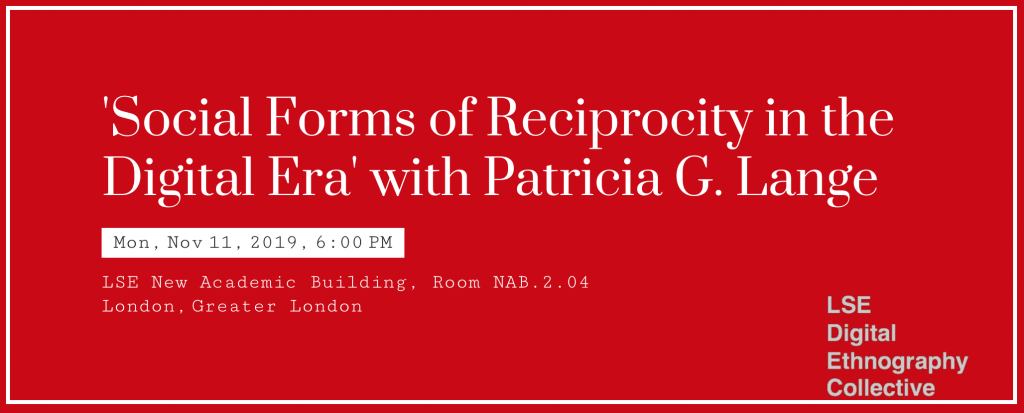
Please join us on Monday 11th November for our third meeting! The wonderful Patricia G. Lange will be joining us from San Francisco via Skype to give a talk on Social Forms of Reciprocity in the Digital Era, followed by a Q&A and discussion on the theme of the talk. Many scholars and pundits are concerned that we are “losing” reciprocity and associated warm interactions that form the basis of strong social ties in digital environments. Observations of rampant narcissism in video making has lead to anxieties that on sites such as YouTube, insufficient attention is being paid to fellow video makers. This talk will outline the ways in which attentional reciprocities (such as watching each others’ videos) as well as gestures of mutual support in hard times are apparent amid a group of YouTube participants who use the site socially. At the same time, the talk also draws from anthropological theory to show that not all reciprocities are mutually beneficial. Some bids at attentional reciprocity are used to gain asymmetrical advantage in YouTube viewing metrics. YouTubers who detect such insincere bids at attention tend to eschew them to preserve a creative and social atmosphere on the site. Rather than being a panacea for successful interaction, the talk will explore nuanced forms of reciprocity—and its withholding—to illustrate how reciprocities are enacted and contested within a video sharing milieu.
Patricia G. Lange is an anthropologist and associate professor of Critical Studies (undergraduate program) and Visual & Critical Studies (graduate program) at California College of the Arts in San Francisco, California. Her work focuses on the use of video to express the self and engage in sociality. Her new book, Thanks For Watching: An Anthropological Study of Video Sharing on YouTube (University Press of Colorado, 2019), analyzes how YouTubers used the site to form community, engage in attentional reciprocity, and provide mutual support. She is also the author of Kids on YouTube: Technical Identities and Digital Literacies (Routledge, 2014). Her website is: patriciaglange.org
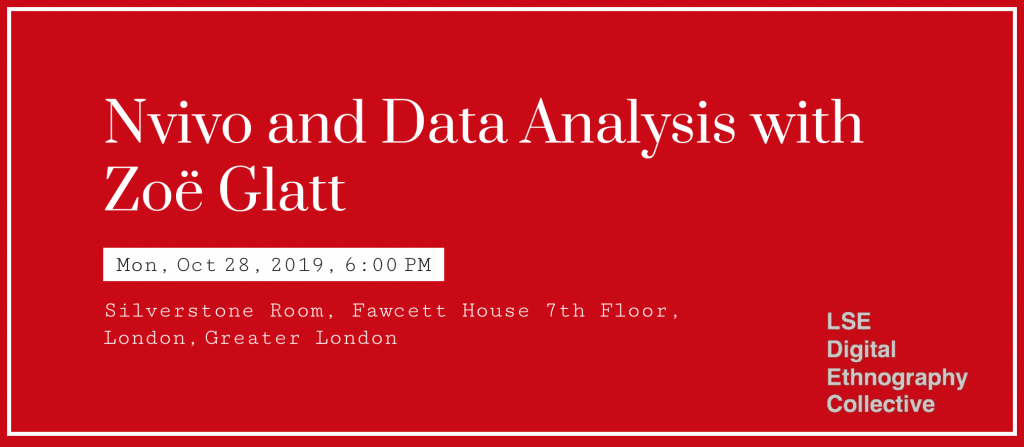
WATCH RECORDING HERE
Please join us on Monday 28th October for our second meeting! This session will be a workshop run by Zoë Glatt on using Nvivo for digital ethnographic data analysis. Zoë will open the session by showing how she has analysed her PhD data in Nvivo and then will open up the discussion to how attendees have approached this issue themselves. The session is aimed at thinking through how different approaches to data analysis have an impact on the ways in which projects develop and ideas form. We invite participants to bring their laptops and share their own experiences with data analysis or their future plans for projects.
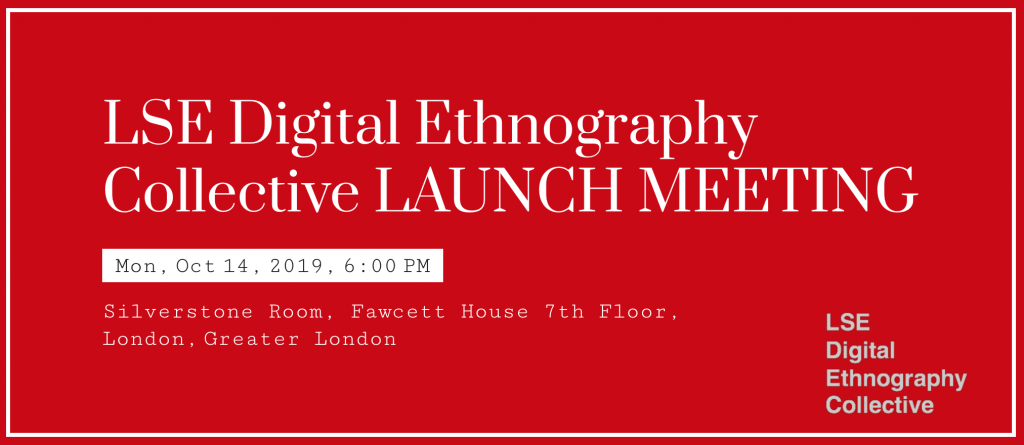
WATCH RECORDING HERE
We are pleased to announce the LSE Digital Ethnography Collective, a new interdisciplinary group exploring the intersections of digital culture and ethnographic methods. We invite scholars at all levels to join us in fortnightly meetings where we will host speakers and workshop new ideas. We welcome those interested in online culture (Internet/platforms/social media), and the ethnographic study of digital technologies. The aim of the group to establish a community of scholars of digital ethnography and to work through challenges in this emerging subdiscipline. Please join us for our launch meeting on Monday 14th October! In the first session we’ll get to know each other and discuss the future of the group. We will go to the pub afterwards if people would like to!

